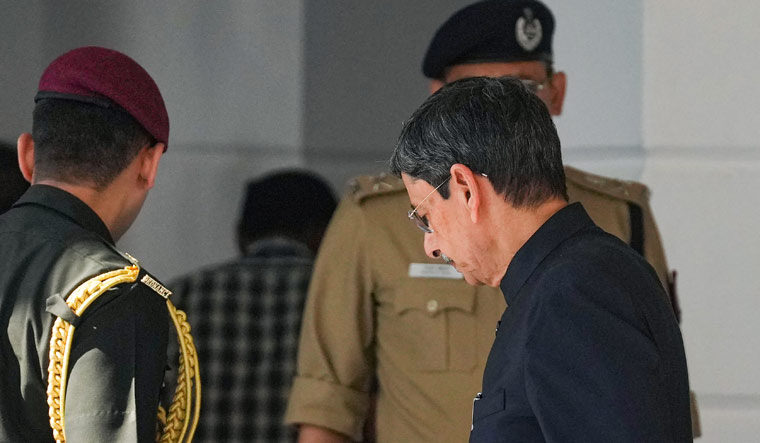Explained | The 10 bills on which Tamil Nadu Governor R.N.Ravi faced Supreme Court setback
 Tamil Nadu Governor R.N. Ravi during the Assembly session | PTI
Tamil Nadu Governor R.N. Ravi during the Assembly session | PTI
The Supreme Court on Tuesday came down heavily on Tamil Nadu Governor R.N.Ravi, invoking his inherent powers. The court declared assent to the 10 bills that were withheld by the Governor from January 2020 to April 2023, saying that the bills are deemed to have been assented to.
The state legislature had passed 12 bills in the assembly mostly relating to the appointment of vice-chancellors in the state-run universities. Governor Ravi did not give his assent to the bills. In the meantime, the Tamil Nadu government in November 2023 went to the Supreme Court. Hearing the petition, the apex court expressed serious concerns over the Governor sitting on the bills passed in the state assembly. Ravi referred two of the bills to the President and did not give consent for the remaining 10 bills.
Following the Governor’s action, a special session of the assembly was convened on November 18, 2023, to readopt the bills. Ravi had returned most of the bills after the DMK government under M.K. Stalin took charge. He had returned the anti-NEET bill and then the online gambling bill passed in the assembly. The anti-NEET bill was, however, readopted by the assembly and resent to the governor. The bill was later sent by Ravi to President Draupadi Murmu. And then Ravi signed the online gambling bill after it was readopted in the assembly.
Ravi’s actions on the bills passed by the assembly have always led to controversy in the state. At a Raj Bhavan event, he said if a bill doesn’t get his assent, it means that the bill is dead.
Here is the list of the 10 pending bills deemed to be approved as per SC verdict:
1. Tamil Nadu Veterinary and Animal Sciences University (Amendment) Bill - Passed in January 2020 during the AIADMK regime, this bill aimed to confer the state government with powers of inspection and inquiry instead of the Chancellor (Governor) and included a government nominee in the vice-chancellor selection panel.
2. Tamil Nadu Fisheries University (Amendment) Bill - Also passed in January 2020 under the AIADMK regime, this sought to rename the institution as Tamil Nadu Dr J. Jayalalithaa Fisheries University and shift administrative oversight powers to the state government.
3. Madras University (Amendment) Bill - Passed in April 2022 by the DMK government, this bill aimed to empower the state government to appoint the vice-chancellor, removing the Governor from the role of Chancellor, aligning with practices in states like Gujarat, Telangana, and Karnataka.
4. Tamil Nadu Agricultural University (Amendment) Bill - Passed in 2022, this bill sought to amend the university’s statutes to allow the state government to appoint the vice-chancellor, reducing the Governor’s authority.
5. Tamil Nadu Dr Ambedkar Law University (Amendment) Bill - Passed in 2022, this aimed to shift the power of appointing the vice-chancellor from the Governor to the state government.
6. Tamil Nadu Dr MGR Medical University (Amendment) Bill - Passed in 2022, this bill proposed similar changes to enable the state government to appoint the vice-chancellor instead of the Governor.
7. Tamil University (Amendment) Bill - Passed in 2022, this sought to amend the governance structure to allow the state government to appoint the vice-chancellor.
8. Tamil Nadu Veterinary and Animal Sciences University (Further Amendment) Bill - Passed in 2023 by the DMK government, this was an additional amendment to further consolidate state control over the university’s administration.
9. Siddha Medical University Bill - Passed in 2023, this bill aimed to establish a distinct university for Siddha Medicine near Chennai, with the state government seeking control over its governance structure.
10. Anna University (Amendment) Bill - This bill sought to amend the university’s statutes to shift the vice-chancellor appointment authority to the state government.
It may be recalled that the governor-government tussle reached such a high that minister K. Ponmudy, who was holding the higher education portfolio then, chose to boycott the Madurai Kamaraj University convocation ceremony in 2023, as a protest against Ravi’s refusal to confer honorary doctorate to freedom fighter and comrade N. Sankaraiah.
Ravi’s actions have always invited the ire of the state government that Chief Minister Stalin went to the extent of bringing in a resolution in the floor of the assembly immediately after the Governor finished his customary address. Ravi walked out in a huff after understanding that the resolution was against him in 2023.
India